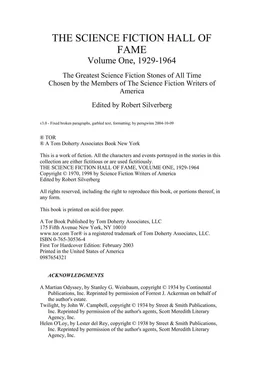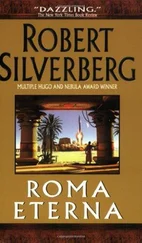"The Martian wasn't a bird, really. It wasn't even bird-like, except just at first glance. It had a beak all right, and a few feathery appendages, but the beak wasn't really a beak. It was somewhat flexible; I could see the tip bend slowly from side to side; it was almost like a cross between a beak and a trunk. It had four-toed feet, and four-fingered things— hands, you'd have to call them, and a little roundish body, and a long neck ending in a tiny head—and that beak. It stood an inch or so taller *an I, and—well, Putz saw it!"
The engineer nodded. "Ja/1 saw!"
Jarvis continued. "So—we stared at each other. Finally the creature went into a series of clackings and twitterings and held out its hands toward me, empty. I took that as a gesture of friendship."
"Perhaps," suggested Harrison, "it looked at that nose of yours and thought you were its brother!"
"Huh! You can be funny without talking! Anyway, I put up my gun and said 'Aw, don't mention it,' or something of the sort, and the thing came over and we were pals.
"By that time, the sun was pretty low and I knew that I'd better build a fire or get into my thermo-skin. I decided on the fire. I picked a spot at the base of the Thyle cliff, where the rock could reflect a little heat on my back. I started breaking off chunks of this desiccated Martian vegetation, and my companion caught the idea and brought in an armful. I reached for a match, but the Martian fished into his pouch and brought out something that looked like a glowing coal; one touch of it, and the fire was blazing—and you all know what a job we have starting a fire in this atmosphere!
"And that bag of his!" continued the narrator. "That was a manufactured article, my friends; press an end and she popped open—press the middle and she sealed so perfectly you couldn't see the line. Better than zippers.
"Well, we stared at the fire a while and I decided to attempt some sort of communication with the Martian. I pointed at myself and said 'Dick'; he caught the drift immediately, stretched a bony claw at me and repeated 'Tick.' Then I pointed at him, and he gave that whistle I called Tweel; I can't imitate his accent. Things were going smoothly; to emphasize the names, I repeated 'Dick,' and then, pointing at him, Tweel.'
"There we stuck! He gave some clacks that sounded negative, and said something like 'P-p-p-root.' And that was just the beginning; I was always 'Tick,' but as for him—part of the time he was 'Tweel,' and part of the time he was 'P-p-p-proot,' and part of the time he was sixteen other noises!
"We just couldn't connect. I tried 'rock,' and I tried 'star,' and 'tree,' and 'fire,' and Lord knows what else, and try as I would, I couldn't get a single word! Nothing was the same for two successive minutes, and if that's a language, I'm an alchemist!
Finally I gave it up and called him Tweel, and that seemed to do.
"But Tweel hung on to some of my words. He remembered a couple of them, which I suppose is a great achievement if you're used to a language you have to make up as you go along. But I couldn't get the hang of his talk; either I missed some subtle point or we just didn't think alike—and I rather believe the latter view.
"I've other reasons for believing that. After a while I gave up the language business, and tried mathematics. I scratched two plus two equals four on the ground, and demonstrated it with pebbles. Again Tweel caught the idea, and informed me that three plus three equals six. Once more we seemed to be getting somewhere.
"So, knowing that Tweel had at least a grammar school education, I drew a circle for the sun, pointing first at it, and then at the last glow of the sun. Then I sketched in Mercury, and Venus, and Mother Earth, and Mars, and finally, pointing to Mars, I swept my hand around in a sort of inclusive gesture to indicate that Mars was our current environment. I was working up to putting over the idea that my home was on the earth.
"Tweel understood my diagram all right. He poked his beak at it, and with a great deal of trilling and clucking, he added Deimos and Phobos to Mars, and then sketched in the earth's moon!
"Do you see what that proves? It proves that Tweel's race uses telescopes—that they're civilized!"
"Does not!" snapped Harrison. "The moon is visible from here as a fifth magnitude star. They could see its revolution with the naked eye."
"The moon, yes!" said Jarvis. "You've missed my point. Mercury isn't visible!
And Tweel knew of Mercury because he placed the Moon at the third planet, not the second. If he didn't know Mercury, he'd put the earth second, and Mars third, instead of fourth! See?"
"Humph!'' said Harrison.
"Anyway," proceeded Jarvis, "I went on with my lesson. Things were going smoothly, and it looked as if I could put the idea over. I pointed at the earth on my diagram, and then at myself, and then, to clinch it, I pointed to myself and then to the earth itself shining bright green almost at the zenith.
"Tweel set up such an excited clacking that I was certain he understood. He jumped up and down, and suddenly he pointed at himself and then at the sky, and then at himself and at the sky again. He pointed at his middle and then at Arcturus, at his head and then at Spica, at his feet and then at half a dozen stars, while I just gaped at him. Then, all °f a sudden, he gave a tremendous leap. Man, what a hop! He shot straight up into the starlight, seventy-five feet if an inch! I saw him silhouetted against the sky, saw him turn and come down at me head first, and land smack on his beak like a javelin! There he stuck square m the center of my sun-circle in the sand—a bull's eye!"
"Nuts!" observed the captain. "Plain nuts!"
That's what I thought, too! I just stared at him open-mouthed while ne pulled his head out of the sand and stood up. Then I figured he'd nussed my point, and I went through the whole blamed rigamarole again, and it ended the same way, with Tweel on his nose in the middle of my picture!"
"Maybe it's a religious rite," suggested Harrison.
"Maybe," said Jarvis dubiously. "Well, there we were. We could exchange ideas up to a certain point, and then—blooey! Something in us was different, unrelated; I don't doubt that Tweel thought me just as screwy as I thought him. Our minds simply looked at the world from different viewpoints, and perhaps his viewpoint is as true as ours. But— we couldn't get together, that's all. Yet, in spite of all difficulties, I liked Tweel, and I have a queer certainty that he liked me."
"Nuts!" repeated the captain. "Just daffy!"
"Yeah? Wait and see. A couple of times I've thought that perhaps we—" He paused, and then resumed his narrative. "Anyway, I finally gave it up, and got into my thermo-skin to sleep. The fire hadn't kept me any too warm, but that damned sleeping bag did. Got stuffy five minutes after I closed myself in. I opened it a little and bingo!
Some eighty-below-zero air hit my nose, and that's when I got this pleasant little frostbite to add to the bump I acquired during the crash of my rocket.
"I don't know what Tweel made of my sleeping. He sat around, but when I woke up, he was gone. I'd just crawled out of my bag, though, when I heard some twittering, and there he came, sailing down from that three-story Thyle cliff to alight on his beak beside me. I pointed to myself and toward the north, and he pointed at himself and toward the south, but when I loaded up and started away, he came along.
"Man, how he traveled! A hundred and fifty feet at a jump, sailing through the air stretched out like a spear, and landing on his beak. He seemed surprised at my plodding, but after a few moments he fell in beside me, only every few minutes he'd go into one of his leaps, and stick his nose into the sand a block ahead of me. Then he'd come shooting back at me; it made me nervous at first to see that beak of his coming at me like a spear, but he always ended in the sand at my side.
Читать дальше












